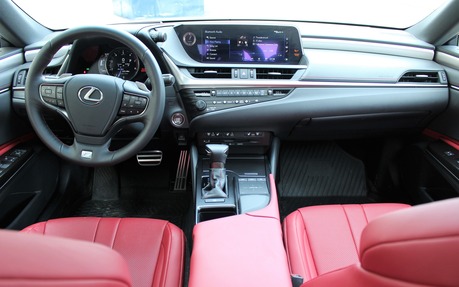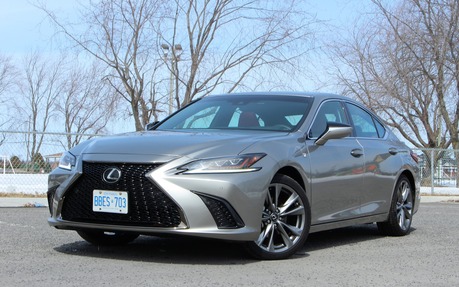2019 Lexus ES 350: Still the One
The Lexus ES may not be the brand’s best-selling car in Canada – that title belongs to the Lexus IS – but in is in the United States. By a mile. Needless to say, it’s an important model for the company and it couldn’t mess up the ES’ redesign.
Flaunting a new look for the 2019 model year, the Lexus ES even has a sportier flair to it, as is the case with the Toyota Avalon with which it shares its platform and many mechanical components. However, the comparison stops there.
Actually, which cars can we compare the ES to? There’s the Kia Cadenza and the Buick LaCrosse, but they’re both being pulled from the Canadian market after 2019. We could also consider the Chrysler 300, the Acura TLX, the Volkswagen Arteon and the Lincoln MKZ.
This year, the ES 350 gets a small dose of sportiness—but not too much to scare away its more conservative fan base—with the availability of F SPORT packages. The first one adds a more aggressive appearance, 19-inch alloy wheels, an adaptive suspension, an F SPORT steering wheel, F SPORT NuLuxe upholstery and a drive mode system with an S+ setting, among other things. The second one, which equipped our test car, piles on more comfort and convenience features like wireless phone charging, blind spot monitoring with rear cross traffic alert, head-up display, a 12.3-inch infotainment screen and LED headlights.

Otherwise, we can choose a panoramic sunroof, full leather seating, a 360-degree camera system, a power-opening trunklid, ambient lighting and a 17-speaker Mark Levinson sound system through the Luxury and Ultra Luxury packages.
The 2019 Lexus ES 350 is powered by a 3.5-litre V6 that develops 302 horses and 267 pound-feet of torque, an eight-speed automatic transmission and a front-wheel drivetrain. It’s a terrific engine that sounds right, revs up quickly, provides good performance and doesn’t cost too much at the pump. It has a combined city/highway rating of 9.1 L/100 km and can run on regular unleaded, while the F SPORT editions are rated at 9.4. We obtained an average of 9.0 L/100 km during our test. Not bad at all.
The Lexus ES 300h is also back with a new-generation hybrid powertrain consisting of a 2.5-litre four-cylinder engine, an electric motor and an electronically controlled, continuously variable automatic transmission. Total output is rated at 215 horsepower and its combined fuel economy is set at 5.3 L/100 km. It has a different character and isn’t available in F SPORT guise.
Our tester’s cockpit was particularly beautiful with the red upholstery and contrast stitching, while the driver-oriented dashboard design is tasteful and well executed. As usual, we could spend hours travelling in this car and still feel relaxed upon arriving at our destination, although we could use a little more headroom. On the other hand, the infotainment system is a piece of work, as the touchpad interface is difficult to use while driving, and quite distracting. Apple CarPlay is standard, but Android Auto isn’t available yet.

Positioned between the Lexus IS and the Lexus GS, the ES offers the best of both worlds and we wouldn’t be surprised to see IS owners trade in for its bigger sister, now that it’s sportier in both appearance and character. It also benefits from an excellent reputation for reliability; if not for some issues with the infotainment system, this car could be considered indestructible. It also holds its value for a long while, since it’s a sought-after pre-owned vehicle.
Pricing starts at $45,000 before freight and delivery charges for the ES 350, while the ES 300h is listed at $47K. As standard, we get automatic high beams, adaptive cruise control, pre-collision warning with pedestrian detection, lane keep assist, dual-zone climate control, power-adjustable, heated and ventilated front seats, a 10-speaker stereo, an eight-inch touchscreen and a power sunroof. As for the heated steering wheel, it's included in every optional package, so only the base trim level doesn't get it. Our F SPORT tester checked in at a still reasonable $54,800.
We prefer if over rivals such as the 300, the MKZ and the TLX—though the Arteon is a more dynamic and more practical car overall, albeit a little less powerful. We’ll compare the Lexus one last time to the Toyota Avalon by saying that between the two, we’d choose the ES. It’s attractive, solid like a drum and nicely dressed up inside. The 2019 Lexus ES has improved considerably, yet has kept the rational virtues that made it so popular over time. For many loyal Lexus customers, it’s still the one.
| Test drive report | |
| Test model | 2019 Lexus ES |
|---|---|
| Trim level | 350 F Sport |
| Price range | $45,000 – $61,500 |
| Price as tested | CA$54,800 |
| Warranty (basic) | 4 years/80,000 km |
| Warranty (powertrain) | 6 years/110,000 km |
| Fuel economy (city/highway/observed) | 10.7 / 7.6 / 9.0 L/100km |
| Options | N/A |
| Competitive models | Acura TLX, Buick LaCrosse, Cadillac CTS, Chrysler 300, Kia Cadenza, Lincoln MKZ, Nissan Maxima, Volvo S60 |
| Strong points |
|
| Weak points |
|
| Editor's rating | |
| Fuel economy | Not too shabby in the fuel economy department, and the engine runs on regular unleaded. |
| Comfort | Excellent seats, but we could use a little more headroom. |
| Performance | The V6 engine provides good performance and a satisfying growl. |
| Infotainment | The features are there, but the touchpad interface is frustrating to use and Android Auto integration isn’t available. |
| Driving | It’s not sport sedan, and it shouldn’t be one either. Yet the new and stiffer platform enhances the car’s driving dynamics up a notch. |
| Overall | As it has always been, the Lexus ES is the most sensible sedan in the brand’s lineup. Now with a little more flair that should appear to a wider audience. |
